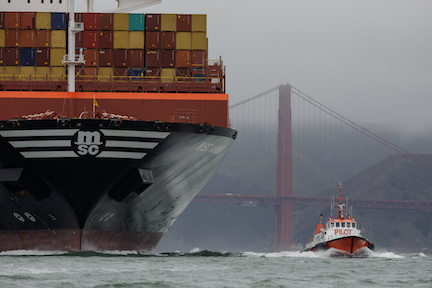The following is text of a news release from the Port of Oakland:
(OAKLAND, Calif.) — Coronavirus may be hampering global trade, but it hasn't broken the supply chain at the Port of Oakland. The latest evidence: the largest ship ever to call in Oakland arrived this week. The container vessel MSC Anna berthed at the port Thursday.
The ship tied up at Oakland International Container Terminal on Oakland Estuary. The port said that the 1,312-foot-long vessel is on special assignment from Geneva-based shipping line MSC. It collected a backlog of empty containers in Southern California before arriving in Oakland. It’s scheduled to spend 24 hours here discharging import containers and loading exports.
“We’ve spent years, and millions of dollars keeping ahead of the pace of trade and the size of ships,” said Port of Oakland Executive Director Danny Wan. “We’re ready for MSC Anna and we’ll welcome her back any time.”
The arrival is gratifying for Oakland, which has growth aspirations despite recent cargo volume declines from the coronavirus pandemic. MSC Anna can carry up to 19,200 20-foot cargo containers. That makes it one of the largest vessels ever to visit a North American port. It's bigger than CMA Benjamin Franklin, which came to Oakland in 2016. That ship can carry 18,000 20-foot containers.
Over the past decade, the port has dredged waterways and raised container cranes to receive so-called megaships. The largest cargo vessels anywhere in North America arrive in Oakland daily, the port said.
San Francisco Bar Pilots said they undertook extensive planning with the port and MSC to prepare for the arrival of MSC Anna. Pilots navigate ships in and out of San Francisco Bay and guide them to ports.
According to Joseph Long, president of the Bar Pilots Association, preparations for MSC Anna’s arrival included computer simulations at the Cal State Maritime Academy in Vallejo. The simulations contributed to a better understanding of navigational demands created by megaships, he explained.
“The San Francisco Bay is one of the most challenging pilotage grounds in the world and safely piloting these huge ships requires expertise and significant training,” Long said. “The COVID-19 crisis has highlighted the importance of the global supply chain to our region’s economy. We are pleased to continue our tradition of safety and service to support this vital part of the infrastructure.”

